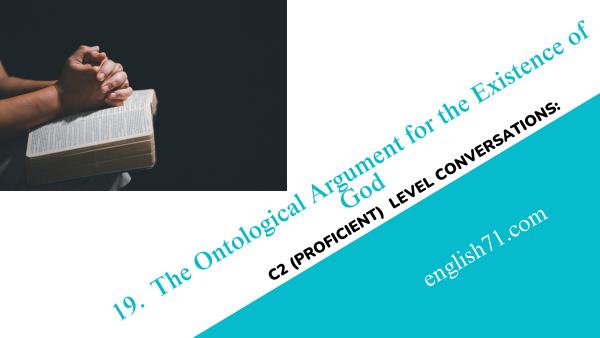C2 (Proficient) level Conversations: (19) The Ontological Argument for the Existence of God

Rachael: Hey Max, have you ever come across the ontological argument for the existence of God?
Max: Yeah, I’ve read a bit about it. It’s an interesting philosophical concept that tries to prove God’s existence based solely on the concept of God as the most perfect being.
Rachael: Exactly. The argument goes something like this: God is defined as the most perfect being imaginable. Existence is a perfection. Therefore, if we can conceive of a perfect being, it must exist, because existence is a necessary attribute of perfection.
Max: Right, but critics often challenge the validity of this argument. They argue that existence is not a property like power or knowledge, so it doesn’t necessarily follow that a being must exist just because we conceive of it as perfect.
Rachael: That’s true. Some philosophers argue that existence is a necessary condition for any meaningful attributes to be applied to something, while others disagree.
Max: Another criticism is that the argument seems to presuppose that existence is a predicate, but in reality, it’s more of a statement about the nature of a thing rather than an attribute that a thing possesses.
Rachael: Absolutely. It’s a complex and debated topic in philosophy, touching on issues of metaphysics, logic, and theology. But regardless of one’s stance on the ontological argument, it’s fascinating to explore the different perspectives and philosophical implications it raises.
Max: Definitely. It’s one of those topics that really makes you think deeply about the nature of existence and our understanding of reality.
Rachael: Exactly. And that’s what makes philosophy so intriguing – it challenges us to question our assumptions and explore the fundamental questions of existence and meaning.
Max: Couldn’t agree more. Thanks for the thought-provoking conversation, Rachael.



Summary:
Rachael and Max engage in a thoughtful discussion about the ontological argument for the existence of God. They explore the premise that God, as the most perfect being, must necessarily exist based on the concept of perfection. However, they also consider criticisms of the argument, such as whether existence is truly a perfection and whether existence can be considered a predicate. Despite the complexities and debates surrounding the topic, they appreciate the opportunity to delve into profound philosophical questions about existence and meaning.

